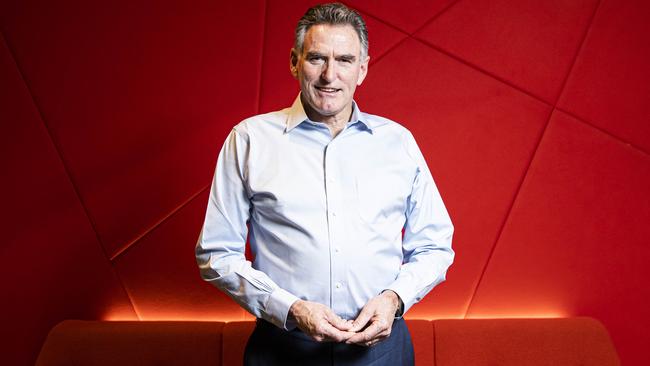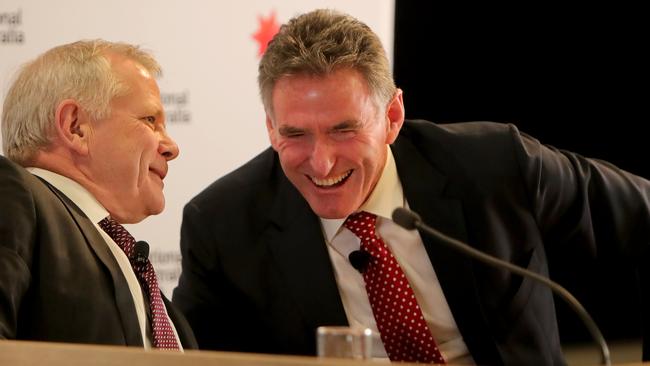End of an era as Ross McEwan hands in his notice at NAB
The departure of the straight-talking New Zealand-born Ross McEwan marks the end of an era for an old school banker in a time of digital-first finance.

National Australia Bank chief executive, Ross McEwan, is ending a 20-year career in banking after successfully navigating two major challenges – the turnaround of the troubled RBS in Britain and the restoration of the National Australia Bank in the wake of its battering at the hands of the banking royal commission.
The departure of the straight-talking New Zealand-born McEwan, who began his career as an accountant at insurance company National Mutual and went on to run its successor AXA in New Zealand, before joining the Commonwealth Bank as group executive in charge of retail banking, marks the end of an era for an old school banker in a new era of digital-first finance.
Passed over for the top job at the CBA in 2011 in favour of fellow New Zealander Ian Narev, McEwan headed to Britain in the wake of the global financial crisis and took on a massive job of cleaning up the Royal Bank of Scotland (RBS) which had to be bailed out by the government.
Just over seven years later, at the age of 62, he was recruited by NAB chair Phil Chronican to take on the big challenge of turning around the bank most savaged by the royal commission with a reputation for being accident prone, still reeling from the departure of its chair and chief executive.
He took on the top job in December 2019, only months before Covid struck, with a mandate to change the bank in the wake of the royal commission.
It is a testament to his combination of experience, skills, steady hand and back-to-basics approach, that McEwen leaves NAB after more than four years in the job, with Citi analysts noting that “Ross potentially had the strongest support of any of the bank CEOs from the investor base.”
“Given NAB has achieved a strong rerating in recent years from its strong execution and transparency, the bar has been set very high for (his successor) Mr Irvine,” the Citi report said.
Chronican described McEwan as “one of the most experienced CEOs in the market place” who was leaving the bank “in pretty good shape”,
Former CBA chief executive and former chair of the Future Fund, David Murray described McEwan as a “grassroots banker. He was very capable.”
Murray said McEwan “would have done well” as chief executive of the Commonwealth Bank had he got the top job.

Ross’s job at RBS “required a very steady hand. The bank was in such a horrible mess. He seems to have tackled that well. He is a loss to the industry.”
Looking back on his time at RBS, McEwan recalled the depth of the problem he had to deal with as the financial crisis hit the British banking system with the government having to bail out RBS.
He said many people told him when he started at NAB that he didn’t understand the challenge of the job in the wake of the royal commission.
“What you experienced (in banking in Australia) I had every month at the Royal Bank of Scotland,” he told them.
The goal at NAB, when he took over, was “getting the bank focused on the business of banking and not being an accident prone bank and getting the team’s head back up again.”
The challenge was to change the culture and focus the bank at a time when it was making money – unlike the loss making RBS when the case for major change may have been easier.
The past few years at NAB, he said, was about “getting our mojo back but in a humble way”.
One British banker said McEwan was a “practical, get-it-done type of guy” who was “well respected in the UK for cleaning up the mess of RBS”.
McEwan had taken over RBS when it was in a “parlous state” and was “at odds with the regulators, treasury and government”.
“He went about the really tough task of cleaning each (problem) up one by one. It was tough job, not much fun at all”.
“Is he old school? If by that you mean understanding balance sheet, cost management and liquidity funding. then he’s old school. I’d argue they’re just as important for the new school digital first leaders of today.”

Asked how banking had changed, McEwan said banking had always been about looking after the needs of customers.
“What has changed is the delivery mechanism,” he said. “25 years ago, it was all about branch networks and contact centres. There were no mobile phones in those days to do your banking.”
“It is the delivery mechanisms which have now changed – the use of technology and the issues around cyber attacks and scams.
“I fundamentally do not believe that banking has changed for hundreds of years. It how you go about it.”
McEwan leaves the job with two significant achievements at NAB acknowledged by analysts – being able to appoint a successor from within the ranks of the banks – and in defending, with the help of his hand picked head of business banking, Andrew Irvine, NAB’s market share in its critical business banking sector at a time when it was under attack from rivals in the wake of the royal commission.
Almost right from the beginning, McEwan set up setting the bank in place with a successor, hiring Irvine, the then head of Canada business banking at the Bank of Montreal, and bringing him to Australia, all during the Covid lockdowns of 2020.
As head of the business bank, Irvine was clearly in line as a successor if he could prove himself, which he clearly has done.
NAB was praised on Wednesday for its decision to look internally for its next chief executive, albeit from an executive who only joined the Bank just over three years ago.
“Andrew Irvine is fortunate to take over a bank which has now got the basics right,” Morningstar banking analyst, Nathan Zaia, said.
“As the man running the business bank which is the engine room of NAB, we take comfort it will be a smooth transition. “
It’s also nice to see the appointment made internally.
“This says the bank has probably made executive appointments with an eye on those individuals being future CEO candidates.”




To join the conversation, please log in. Don't have an account? Register
Join the conversation, you are commenting as Logout